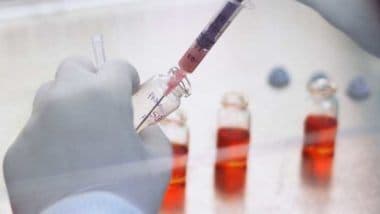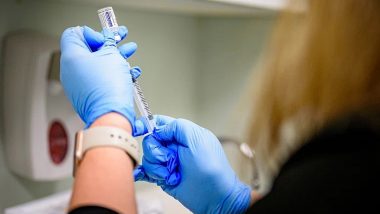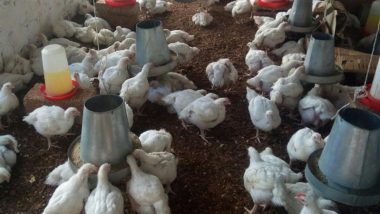London, October 11: Scientists in the UK will begin recruiting frontline healthcare workers to test if an old vaccine used to combat tuberculosis (TB), the Bacillus Calmette-Guerin or BCG jab, can be repurposed to help boost immunity against the novel coronavirus as well.
The University of Exeter in south-west England said on Sunday that it is leading the UK arm of the worldwide research called the BCG vaccination to Reduce the impact of COVID-19 in healthcare workers (BRACE) trial. Also Read | Azerbaijan: Seven Dead, Over 30 Injured as Rocket Destroys Building in Ganja.
Participants will be given either the BCG vaccine, currently given to more than 100 million babies worldwide each year, including in India, to protect against TB, or a placebo injection.
The BCG vaccine boosts immunity by “training” the immune system to respond to other subsequent infections with greater intensity. Researchers hope this improved “innate immunity” will buy crucial time to develop an effective and safe vaccine against COVID-19. Also Read | US: 1 Killed During Shooting at Rival Rallies in Denver.
“COVID-19 has killed more than a million people globally, with well over 33 million people acquiring the disease, sometimes in its severest forms. BCG has been shown to boost immunity in a generalised way, which may offer some protection against COVID-19,” said Professor John Campbell from Exeter University, who is the UK lead for the BRACE study.
“We're excited to be contributing to the large-scale, international BRACE study where we are seeking to establish whether the BCG vaccine could help protect people who are at risk of COVID-19. If it does, we could save lives by administering or topping up this readily available and cost-effective vaccination,” he said.
In the UK, routine BCG vaccination – which dates as far back as the 1920s – was stopped in 2005 because of low rates of TB in the general population. Previous studies suggest that the BCG vaccine could reduce susceptibility to a range of infections caused by viruses including those similar to the novel coronavirus causing COVID-19. Examining the mechanism by which this may work is part of the trial being conducted by BRACE researchers.
The UK arm of trial is initially recruiting care home and healthcare workers in the south-west of England, who can attend clinics in Exeter. It is targeting these professionals because they work in fields with high exposure to COVID-19 and is specifically looking at whether the BCG vaccine reduces coronavirus infection or COVID-19 symptom severity.
Prof. Campbell added: “People on the COVID-19 frontline, including healthcare workers and care home workers, are particularly vulnerable to coronavirus infection. Up until now, care home workers have been overlooked by most research.
“The BRACE trial provides us with a great opportunity to offer potential help to this important group of individuals who are providing healthcare to some of our most vulnerable citizens in important community settings.”
The university said that the UK trial will be conducted by the Exeter Clinical Trials Unit and supported by the local National Institute for Health Research funded Clinical Research Facility.
Lynne Quinn, Operations Director of Exeter CTU, said the trial is initially seeking to recruit 1,000 participants who work in care homes and other community healthcare settings. “The first wave of recruitment will take place in and around Exeter, and we have exciting plans to expand to other sites across the UK, so we hope to be expanding our recruitment numbers at a later stage,” she said.
The UK joins the study being coordinated by the Murdoch Children's Research Institute (MCRI) in Melbourne, Australia, with centres in Australia, the Netherlands, Spain, and Brazil as part of the largest trial of its kind.
Together, the trial will recruit more than 10,000 healthcare staff and has received more than USD 10 million from the Bill and Melinda Gates Foundation to allow its global expansion, with the Peter Sowerby Foundation supporting the Exeter University trial site in Britain.
Professor Nigel Curtis, global lead of the BRACE trial at MCRI in Australia, said: “We are delighted that the UK is joining this international trial to help determine if we can repurpose an existing safe vaccine to reduce the impact of COVID-19 in healthcare workers, including those working in care homes who are at particular risk.”
Participants will be asked to complete a daily symptom diary via an app, be tested for COVID-19 whenever they have symptoms, complete regular questionnaires and provide blood samples. These samples will allow scientists to understand how blood cells respond differently to exposure to COVID-19 and other viruses, with and without the BCG vaccine.
(This is an unedited and auto-generated story from Syndicated News feed, LatestLY Staff may not have modified or edited the content body)













 Quickly
Quickly





















